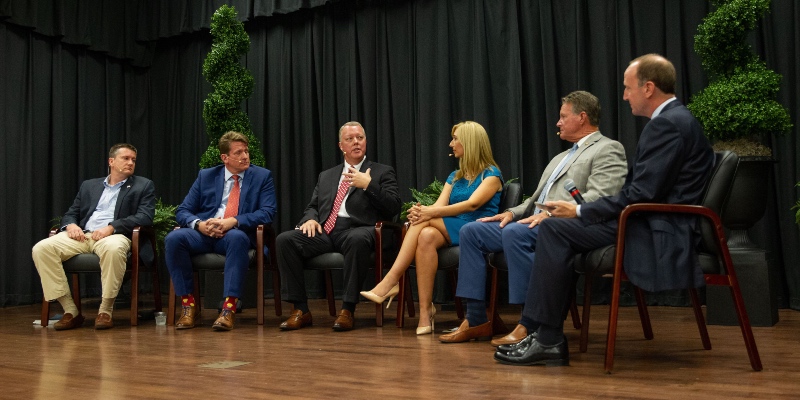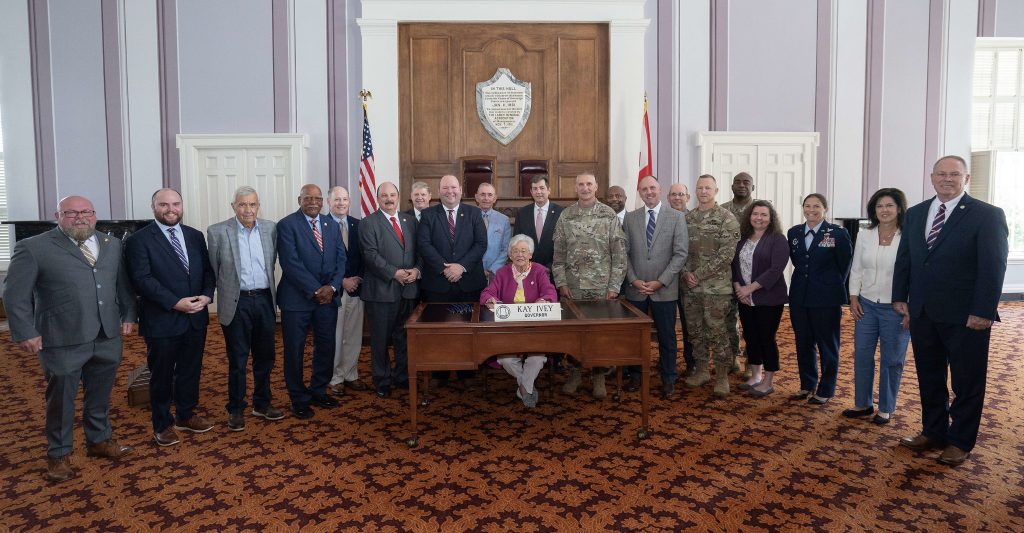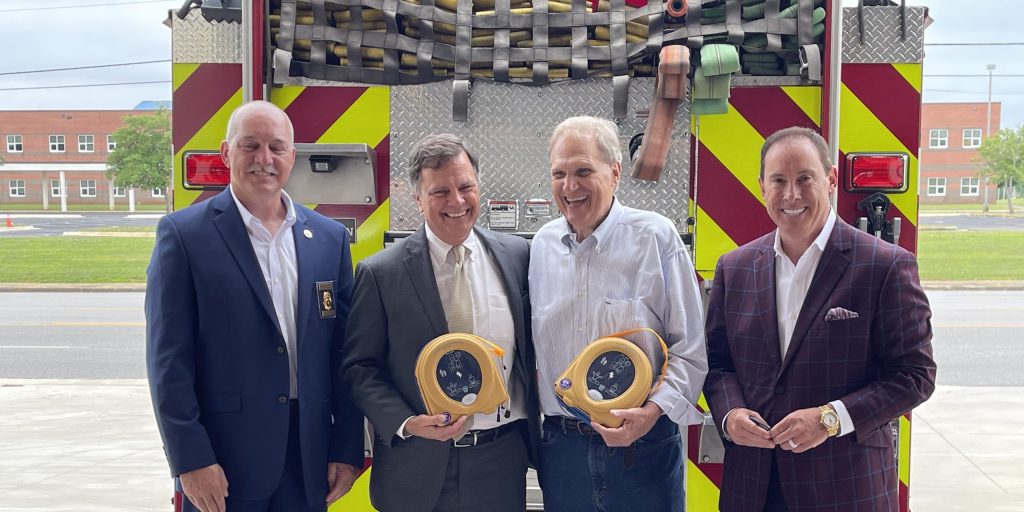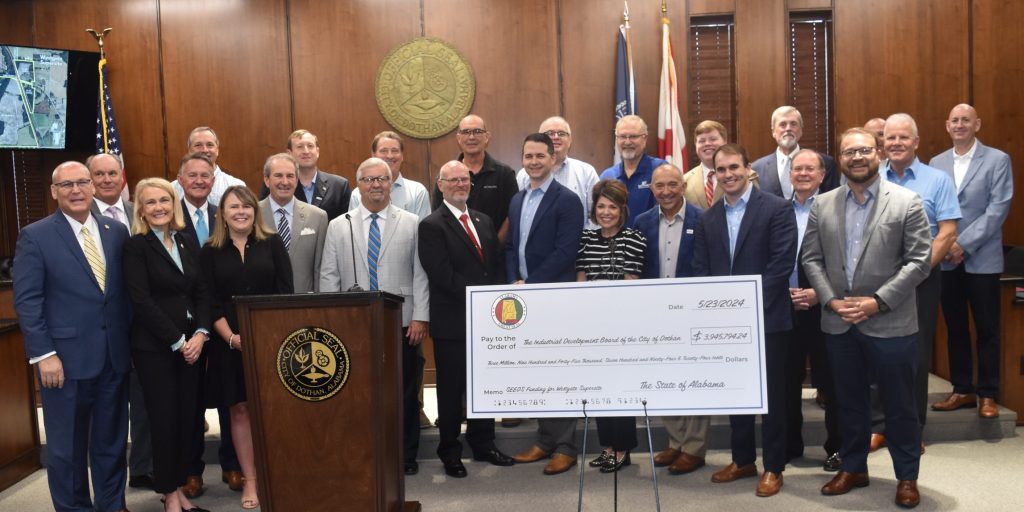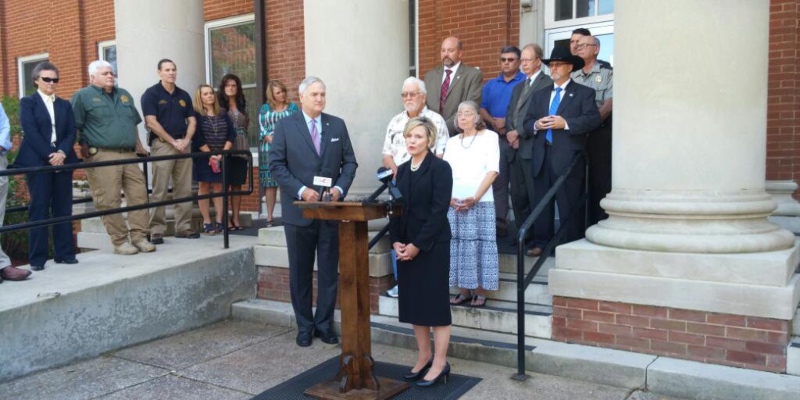DOTHAN — Yellowhammer News last week held the fifth of its 2019 “News Shapers” events: “Connecting Alabama’s rural communities.”
Hosted at Troy University’s Dothan campus, key stakeholders from industry, government and academia came together to discuss building partnerships and community awareness related to broadband expansion efforts across the state.
Yellowhammer co-owner Tim Howe moderated the panel discussion between State Senator Donnie Chesteen (R-Geneva); Brad Kimbro, CEO of Wiregrass Electric Cooperative; Jake Cowen, CFO/general manager of Troy Cablevision, Inc.; Dr. Carmen Lewis, associate dean of Troy University’s Sorrell College; and Sean Strickler, VP public affairs of the Alabama Rural Electric Association.
While the second News Shapers event touching on broadband this year, the Dothan event brought fresh perspectives to the important topic, as well as two unique pieces of news to light.
After Lewis explained how crucial accurate and comprehensive data is to the efficacy of broadband expansion efforts in the state, she advised that the university had helped conduct a recent study providing just that for parts of southeast Alabama.
This was done through Wiregrass Electric customers voluntarily taking internet speed tests, with the 3,400 respondents’ locations also being collected and tracked.
Calling the results “startling,” Lewis emphasized how profound the lack of quality broadband truly is, as so many Alabamians are lacking the internet speeds needed for many functions across modern education, industry and business.
“It was so sad to see that people are really not getting broadband internet speeds that they need and frankly deserve,” she remarked. “We’re living in an age in 2019 where there really shouldn’t be a digital divide between the ‘haves and have-nots.’”
The study specifically concluded that 71% of respondents were not getting 25 megabits per second in download speed and 66% were not getting 3 megabits per second in upload speed. These numbers represent the federal minimums that define what constitutes broadband.
‘We’re standing in the gap for rural America’
With the data now in hand, both Troy Cable and Wiregrass Electric are set on helping provide the people in and around their service areas with high-speed broadband access.
To do this, the companies have formed an innovative partnership, which was covered by WTVY and WDHN as a result of the News Shapers event.
“Serving rural America is what we do, and we’re standing in the gap for rural America,” Kimbro stressed.
While a striking contrast to the political battle that unfolded between the cable and electric utility industries this past regular session of the Alabama legislature, this cross-industry partnership may also be instructive for other entities around the state who are looking for creative ways to increase the rate and cost effectiveness at which broadband can be expanded.
However, one-size-fits-all solutions are certainly not the answer — and really would be the antithesis of the message that this partnership is sending.
Instead, as Strickler outlined, local and regional solutions are needed to best match their respective areas in Alabama. Electric cooperatives around the state are as community-minded as you can get, enabling them to understand the needs of and potential solutions for their locales.
Kimbro echoed recent comments made by other electric providers around the state by explaining that the rural broadband issue of today is akin to the rural electricity deficiency of the early-mid 1900’s.
“It’s not just a luxury anymore, it’s a necessity,” he said.
Cowen chimed in, elaborating on the importance of the partnership to addressing this modern necessity.
He said that in sparsely populated rural areas, the partnership is absolutely necessary for Troy Cable because of the high capital costs involved in building out broadband infrastructure to serve relatively few people. Cowen also mentioned the critical public-private collaboration born from the Alabama Broadband Accessibility Fund, which was created by legislation spearheaded by State Sen. Clay Scofield (R-Guntersville) and also championed by Chesteen.
“Without these partnerships with the electric coop letting us get access to their right of way, the state kicking in some grant funds and the university helping prove that it’s a need… we really couldn’t even think about building into these areas,” Cowen emphasized. “So the partnerships are extremely, extremely important.”
Kimbro added that the partnership between the companies helps both of them better leverage these public grant dollars.
He summarized why this is so important for the Alabamians in Wiregrass Electric’s service area.
“If a business doesn’t have [broadband], they’re not going to stay or they’re not going to locate there,” Kimbro outlined. “And if businesses aren’t there, then jobs aren’t there. If jobs aren’t there, families aren’t going to be there.”
Cowen detailed a concrete list of recent economic development projects in and around Troy that perfectly exemplify this point, saying projects like Rex Lumber would not have happened without broadband expansion efforts.
“If you’re trying to have a chance to recruit [new industries or businesses], you have to have high-speed internet,” Chesteen added. “And for those small communities now that have industry, it is imperative that they are able to provide that in order to keep these companies that they have. Because that’s the way they do business.”
The popular state senator expressed his optimism that rural and small town areas will have the potential for growth once quality broadband connectivity is extended to them, rather than the current trend of population loss.
“Without it (broadband access), they really don’t stand a chance,” Chesteen warned.
Panelists further mentioned education and telemedicine, in addition to general quality of life, as other major areas affected by quality broadband access.
Strickler later concluded the panel discussion itself by saying rural Alabama, aided by partnerships, has the chance to be at the forefront of broadband expansion compared to similar areas across the southeast and the nation.
During the question and answer period that followed, Strickler also gave the crowd a poignant note to end on.
“Our number one export in rural Alabama has to quit being our children,” he stressed. “We have to give them a place to stay at home.”
“In rural Alabama. Absolutely,” Chesteen said in agreement.
Sean Ross is the editor of Yellowhammer News. You can follow him on Twitter @sean_yhn




